

Henry Giroux. Henry Giroux (born September 18, 1943), is an American scholar and cultural critic.

Martin Heidegger. His best known book, Being and Time, is considered one of the most important philosophical works of the 20th century.[9] In it and later works, Heidegger maintained that our way of questioning defines our nature.

He argued that Western thinking had lost sight of being. Finding ourselves as "always already" moving within ontological presuppositions, we lose touch with our grasp of being and its truth becomes "muddled".[10] As a solution to this condition, Heidegger advocated a change in focus from ontologies based on ontic determinants to the fundamental ontological elucidation of being-in-the-world in general, allowing it to reveal, or "unconceal" itself as concealment.[11] Heidegger is a controversial figure, largely for his affiliation with Nazism prior to 1934, for which he publicly neither apologized nor expressed regret,[12] although in private he called it "the biggest stupidity of his life" (die größte Dummheit seines Lebens).[13] Overview[edit] Biography[edit] Consequentialism. Consequentialism is usually distinguished from deontological ethics (or deontology), in that deontology derives the rightness or wrongness of one's conduct from the character of the behaviour itself rather than the outcomes of the conduct.
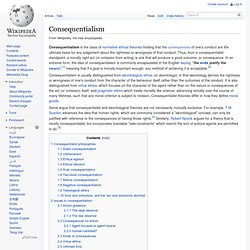
It is also distinguished from virtue ethics, which focuses on the character of the agent rather than on the nature or consequences of the act (or omission) itself, and pragmatic ethics which treats morality like science: advancing socially over the course of many lifetimes, such that any moral criterion is subject to revision. Consequentialist theories differ in how they define moral goods. Some argue that consequentialist and deontological theories are not necessarily mutually exclusive. For example, T.M. Consequentialist philosophies[edit] Positivism. Positivism is a philosophy of science based on the view that information derived from logical and mathematical treatments and reports of sensory experience is the exclusive source of all authoritative knowledge,[1] and that there is valid knowledge (truth) only in scientific knowledge.[2] Verified data received from the senses are known as empirical evidence.[1] This view holds that society, like the physical world, operates according to general laws.

Introspective and intuitive knowledge is rejected. Although the positivist approach has been a recurrent theme in the history of Western thought,[3] the modern sense of the approach was developed by the philosopher and founding sociologist Auguste Comte in the early 19th century.[4] Comte argued that, much as the physical world operates according to gravity and other absolute laws, so also does society.[5] Etymology[edit] Dialectic. Dialectic (also dialectics and the dialectical method) is a method of argument for resolving disagreement that has been central to European and Indian philosophy since antiquity.
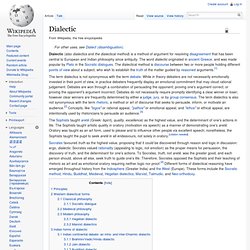
Humanism. In modern times, humanist movements are typically aligned with secularism, and today "Humanism" typically refers to a non-theistic life stance centred on human agency, and looking to science instead of religious dogma in order to understand the world.[2] Background The word "Humanism" is ultimately derived from the Latin concept humanitas, and, like most other words ending in -ism, entered English in the nineteenth century.
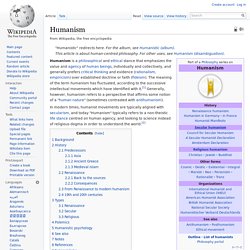
However, historians agree that the concept predates the label invented to describe it, encompassing the various meanings ascribed to humanitas, which included both benevolence toward one's fellow humans and the values imparted by bonae litterae or humane learning (literally "good letters"). In the second century A.D, a Latin grammarian, Aulus Gellius (c. 125– c. 180), complained: Gellius says that in his day humanitas is commonly used as a synonym for philanthropy – or kindness and benevolence toward one's fellow human being. History Predecessors Asia Ancient Greece Types. Age of Enlightenment. The Age of Enlightenment (or simply the Enlightenment or Age of Reason) was a cultural movement of intellectuals beginning in late 17th-century Europe emphasizing reason and individualism rather than tradition.[1] Its purpose was to reform society using reason, to challenge ideas grounded in tradition and faith, and to advance knowledge through the scientific method.

It promoted scientific thought, skepticism, and intellectual interchange.[2] The Enlightenment was a revolution in human thought. This new way of thinking was that rational thought begins with clearly stated principles, uses correct logic to arrive at conclusions, tests the conclusions against evidence, and then revises the principles in the light of the evidence. Enlightenment thinkers opposed superstition and intolerance. Some Enlightenment thinkers collaborated with Enlightened despots, absolutist rulers who attempted to forcibly put some of the new ideas about government into practice. Metaphysics. Metaphysics is a traditional branch of philosophy concerned with explaining the fundamental nature of being and the world that encompasses it,[1] although the term is not easily defined.[2] Traditionally, metaphysics attempts to answer two basic questions in the broadest possible terms:[3] What is ultimately there?
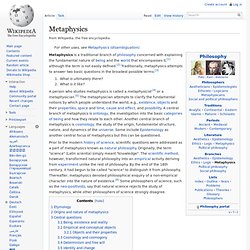
What is it like? Prior to the modern history of science, scientific questions were addressed as a part of metaphysics known as natural philosophy. Originally, the term "science" (Latin scientia) simply meant "knowledge". The scientific method, however, transformed natural philosophy into an empirical activity deriving from experiment unlike the rest of philosophy. Critical rationalism.
Critical rationalism is an epistemological philosophy advanced by Karl Popper.
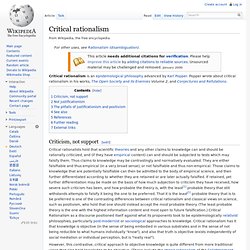
Popper wrote about critical rationalism in his works, The Open Society and its Enemies Volume 2, and Conjectures and Refutations. Criticism, not support[edit] Critical rationalists hold that scientific theories and any other claims to knowledge can and should be rationally criticized, and (if they have empirical content) can and should be subjected to tests which may falsify them. Thus claims to knowledge may be contrastingly and normatively evaluated. They are either falsifiable and thus empirical (in a very broad sense), or not falsifiable and thus non-empirical.
Post-materialism. In sociology, post-materialism is the transformation of individual values from materialist, physical and economic to new individual values of autonomy and self-expression.

Post-materialism is a tool in developing an understanding of modern culture. Post-structuralism. Post-structuralism is a label formulated by American academics to denote the heterogeneous works of a series of mid-20th-century French and continental philosophers and critical theorists who came to international prominence in the 1960s and '70s.[1][2][3] A major theme of post-structuralism is instability in the human sciences, due to the complexity of humans themselves and the impossibility of fully escaping structures in order that we might study them.
Post-structuralism is a response to structuralism. Structuralism is an intellectual movement developed in Europe from the early to mid-20th century. Theory[edit] General practices[edit] The author's intended meaning is secondary to the meaning that the reader perceives. Terror management theory. In social psychology, terror management theory (TMT) proposes a basic psychological conflict that results from having a desire to live but realizing that death is inevitable. Religious views of Albert Einstein. Albert Einstein, 1921. Albert Einstein's religious views have been studied extensively. He said he believed in the "pantheistic" God of Baruch Spinoza, but not in a personal god, a belief he criticized. He also called himself an agnostic, while disassociating himself from the label atheist, preferring, he said, "an attitude of humility corresponding to the weakness of our intellectual understanding of nature and of our own being.
Fascism. Fascism (/ˈfæʃɪzəm/) is a form of radical authoritarian ultranationalism,[1][2] characterized by dictatorial power, forcible suppression of opposition and strong regimentation of society and of the economy,[3] which came to prominence in early 20th-century Europe.[4] The first fascist movements emerged in Italy during World War I before it spread to other European countries.[4] Opposed to liberalism, Marxism and anarchism, fascism is usually placed on the far-right within the traditional left–right spectrum.[5][6][7][4][8][9] Fascists saw World War I as a revolution that brought massive changes to the nature of war, society, the state and technology.
The advent of total war and the total mass mobilization of society had broken down the distinction between civilians and combatants. Etymology Definitions John Lukacs, Hungarian-American historian and Holocaust survivor, argues that there is no such thing as generic fascism. Friedrich Nietzsche. Thus do I counsel you, my friends: distrust all in whom the impulse to punish is powerful! It is precisely facts that do not exist, only interpretations. Friedrich Wilhelm Nietzsche (15 October 1844 – 25 August 1900) was a German philosopher, whose critiques of contemporary culture, religion, and philosophy centered on a basic question regarding the foundation of values and morality.
See also: Postmodern literature. Postmodern literature is literature characterized by heavy reliance on techniques like fragmentation, paradox, and questionable narrators, and is often (though not exclusively) defined as a style or trend which emerged in the post–World War II era. Postmodern works are seen as a reaction against Enlightenment thinking and Modernist approaches to literature.[1] Postmodern literature, like postmodernism as a whole, tends to resist definition or classification as a "movement".
Hermann Hesse. It is not our purpose to become each other; it is to recognize each other, to learn to see the other and honor him for what he is: each the other's opposite and complement. "ZEITGEIST, Part 1" Debunked? NOT! Scientism.